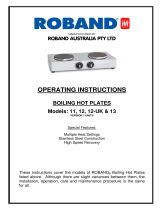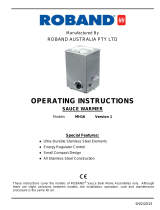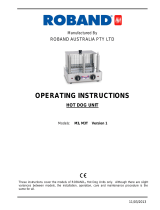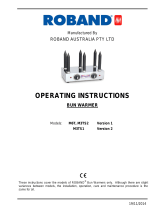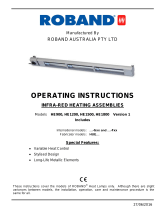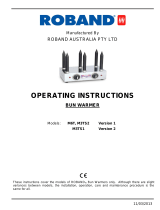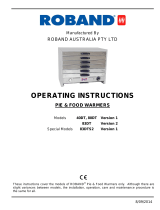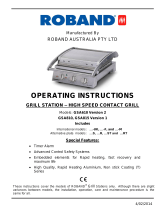Page is loading ...

JUICE EXTRACTOR
INSTRUCTION AND MAINTENANCE MANUAL
GB
0
1
0
1
0
1
ES300
ES700
ES500
Distrubuted in Australia by Roband Australia Pty Ltd
CEADO

JUICE EXTRACTOR
This is a commercial juice extractor for the preparation of fruit and vegetable juices with automatic
pulp ejection.
Like all appliances, it should be used with particular care to avoid injury to personnel and damage
to the appliance.
It is essential to read these instructions carefully before using the appliance and to follow the safety
recommendations.
Do not use the appliance if you have not read and understood these instructions!
F

3
0
1
JUICE EXTRACTOR
Fig. 1
Main parts (Fig. 1 - Fig. 2)
7
3
Fig. 2
2
8
2
1
Motor housing
Bowl
Spout
Juicer cover
Locking arm
Food pusher
Feed chute
Pulp container
8
7
6
5
4
3
2
1
Basket
Pulp retainer*
Grating disc
Start button
ON-OFF (I-O) button
Motor shaft
Drive disc
15
14
13
12
11
10
9
4
12
6
5
13
9
11
10
1
15
14
Model ES500 with feed chute ø 75 mm
* Not standard equipment on all models

SAFETY RECOMMENDATIONS
GENERAL INSTRUCTIONS
1. Read the following instructions carefully before using the appliance.
2. Installation and maintenance should be carried out by qualified personnel only.
3. This appliance is intended for professional use, and should therefore be used by adults and
qualified personnel only.
CLOSE ADULT SUPERVISION IS NECESSARY WHEN CHILDREN ARE NEAR THE
APPLIANCE.
4. Never use this appliance for purposes other than extracting juice from pieces of fruit and
vegetables. Any other use is dangerous.
0
1
0
1
0
1
0
1
Model ES500 with feed chute ø 75
Fig. 4
Fig. 3
ø 50 mm
ø 50 mm
ø 75 mm
Model ES300 with feed chute ø 50 mm
Model ES700 with double feed chute
ø 50 - ø 75 mm
Model ES500S with feed chute ø 50 mm
4

5
5. Always work under safe conditions: do not use the appliance with wet hands or feet. Do not
use outdoors.
6. Keep the original package for possible future use. It is the most suitable protection against
damage during transport.
7. In case of fire use CO
2
extinguishers. Do not use water or powder extinguishers.
8. Never place the appliance in water! Do not clean with the use of a Water Jet.
9. Do not disassemble the appliance or attempt to perform any repairs inside it.
10. Always unplug the appliance before performing any maintenance or cleaning and when it is not
in use.
11. Never pull the appliance by the cord to move it. Never unplug it by pulling the cord or touching
it with wet hands.
If the cord is damaged, it must be replaced by an Authorized Service Center.
12. WARNING: BE CAREFUL to never insert utensils, metal objects or other rigid or sharp
materials in the basket as it is dangerous and could cause injury
.
13. During maintenance procedures and while unpacking, do not hold or lift the appliance by the
locking arm of the juicer cover.
14. When cleaning the appliance use care in handling the basket so you do not alter the alignment
or reduce the performance of the appliance.
15. Do not use the appliance if it is damaged or has loose parts. Immediately contact an
authorized Service Center.
16. Do not push fruit or vegetables into the feed chute with your fingers.
Always use the food
pusher provided.
17. Do not touch the sharp teeth of the grating disc.
18. Do not insert fruit with stones (e. g. peaches, apricots, etc.) without first removing the stone.
19. On model with two feed chutes never insert the ø 50 pusher in the ø 75 chute.
WARNING: DO NOT PUT FINGERS OR ANYTHING OTHER THAN THE APPROPRIA
TE
FOOD PUSHER PROVIDED WITH THE APPLIANCE INSIDE THE FEED CHUTE.
ALWAYS USE THE FOOD PUSHER TO PUSH THE FRUIT T
OWARDS THE ROTATING
GRATING DISC.
SAVE THESE INSTRUCTIONS!

INSTALLATION
Comply with the safety recommendations indicated above and hereafter when installing the
appliance .
1. Make sure that the mains voltage is as indicated on the rating label of the appliance and that
the electrical system is grounded and equipped with a switch.
2. Install the appliance in a DRY, PROTECTED place, far from water sprays or splashes, heat
sources, open flames and inflammable substances.
Place the appliance on a flat, horizontal, stable surface where it cannot tip over.
3. Make sure the switch on the appliance is in the "OFF" position and plug it into a socket
protected by a suitably rated circuit breaker (MCB) or fuses.
Do not use an adaptor plug.
4. Stretch the power cable out to full length. Do not let it pass over sharp edges or hot surfaces.
Do not let oil spill on it. Do not let the power cable hang loose from the counter on which the
appliance stands.
5. To use the appliance more easily, we suggest that the appliance is placed on a table or counter
top so that the juice spout and the controls face towards the right side of the user (suggested
height for counter top from a round level: 90 cm (36 inches), to be adjusted according to the
height of the user).
USE
Make sure the tabletop and feet are clean to ensure grip during operation.
Before first use: rinse all of the parts that will have contact with food in running water i.e.;
food pusher, juicer cover, basket, bowl, pulp container and pulp retainer*. To disassemble the
various parts see Fig. 8 and Fig. 9.
* Not standard equipment on all models.
Suggestions: to reduce the cleaning procedures to a minimum we suggest placing a
biodegradable plastic bag inside the pulp container and folding the top of the bag over the
edge of the pulp container (see Fig. 5). By using this method, once you have finished using
the appliance, you can put the waste directly into a composting or waste bin.
Wash the fruit or vegetables you will use.
NOTE: Many types of fruit and vegetables for example apples, carrots and cucumbers fit
through the feed chute without having to be cut into pieces. When you make juice from carrots
it is a good idea to insert the larger end of the carrot first, or to cut the carrot in two or three
pieces.
For models with feed chute ø 50 mm, use the latter to juice carrots.
T
o optimize the juice output
chop fruit into smaller pieces.
Ensure that the juice extractor is correctly assembled. Ensure that the basket is properly
cleaned before each use.
Check to see that the ON-OFF button is in the “OFF” position and that the locking arm is
hooked on to the juicer cover
.
3
2
1
6

7
Place a container under the spout of the bowl.
Turn the appliance on by pushing the ON-OFF button in the “ON” position.
Turn on the motor by pushing the start button.
With the motor in action put fruit and/or vegetables in the feed chute. Use the food pusher to
gradually push down the fruit and/or vegetables towards the spinning grating disc at the bottom
of the feed chute without exerting excessive pressure (see Fig. 6). To obtain more juice always
press the food pusher lightly.
7
6
5
4
Fig. 5
NEVER USE YOUR FINGERS TO PUSH THE FRUIT AND/OR VEGETABLES DOWN THE
FEED CHUTE OR TO CLEAN THE CHUTE. ALWAYS USE THE FOOD PUSHER
PROVIDED.
The juice will pour from the spout into the container placed below the spout. The separated pulp
will accumulate in the pulp container.
Continue to use the appliance until the container is filled with juice or until you have finished
the fruit or vegetables you are using or ensure the pulp container has become filled with pulp.
Turn the motor off by pushing the ON-OFF button in the "OFF" position.
Note: Always wait until the motor has come to a complete stop before unhooking the locking
arm.
Never use the locking arm to turn the appliance off. This could wear out the safety
mechanisms (safety microswitch and motor brake).
When the appliance is not in use leave the locking arm hooked to the juicer cover and the ON-
OFF button in the "OFF" position.
When using the appliance control the level of pulp in the pulp container (with the motor turned
off). The quantity of fruit or vegetables that can be used before the pulp container is filled
varies depending on the type of fruit or vegetables used.
Should blockage occur while the appliance is in use before the pulp container is filled with
pulp it is a good idea to turn the appliance off and find the cause of the blockage.
NOTE! When using the juice extractor the pulp container can be emptied by turning the appliance
off and carefully removing the pulp container. (Put the pulp container in place before turning
the juice extractor back on).
11
10
9
8

Fig. 6
CLEANING AND MAINTENANCE
Suggestions: to reduce the cleaning procedures to a minimum we suggest placing a biodegradable
plastic bag inside the pulp container, folding the top of the bag over the edge of the pulp container
(see Fig. 5). By using this method, once you have finished using the appliance, you can put the
waste directly in a composting or waste bin.
Before each cleaning turn the appliance OFF and remove the appliance’s plug from the
socket (or turn the socket off).
By keeping the appliance well-cleaned and in working order you can maximize the quality of the
juice extracted and guarantee a longer life for the appliance itself. For this reason, after every use,
you should clean the basket, bowl, juicer cover, pulp container, pulp retainer*, and food pusher so
that residues do not harden and encrust the appliance.
To clean the motor housing, clean with a cloth dampened with water or alcohol or with a
spray neutral solution.
Wipe with a dry cloth.
Never put the motor housing under running water and never immerse in water.
To clean the juicer cover, bowl, basket, pulp container*, pulp retainer and food pusher:
rinse under running water and wash with warm water and washing liquid. Rinse and dry.
* Not standard equipment on all models.
8

Fig. 7
To disassemble these components, unhook the locking arm and remove in this order; food
pusher, juicer cover, basket, pulp retainer*, and bowl (Fig. 8). Reassemble in the reverse order
taking care to place the juice spout in the appropriate slot of the motor housing, place the pulp
retainer
* in its correct place with the internal edge facing up (Fig. 8), place the basket in
the bowl, making sure that the basket’s clutch disc is correctly inserted on the drive disc and
position the juicer cover on the bowl.
* Not standard equipment on all models.
- The removable parts of the juice extractor, with the exception of the pulp container, are
dishwasher safe. The pulp container should not be immersed in hot water. Hot water can
deform the pulp container making it impossible to use.
- To obtain a higher yield of juice always control that the basket is well-cleaned by using the nylon
brush provided. Put the basket under running water and use the brush to clean the inside of
the strainer (see Fig. 7). Hold the basket up against the light to make sure that none of the
perforations are blocked. Should the perforations of the strainer remain blocked, immerse the
basket in a solution of hot water with 12% lemon juice or vinegar to loosen the blocked material.
Alternatively, wash the basket in a dishwasher.
- Handle the basket with care as even the slightest damage to the pulp container can cause the
juice extractor to vibrate undesirably during use.
As some products (such as peeled citrus fruits, celery and tomatoes) can easily encrust or
obstruct the perforations, you should frequently clean the basket.
THE BASKET HAS SMALL SHARP TEETH. DO NOT TOUCH THE TEETH WHEN YOU
HANDLE THE BASKET
.
Do not use abrasive products or sponges to clean the basket.
Do not let traces of fruit or vegetables dry and harden on the pulp container, basket,
juicer cover or food pusher.
Never use bleach or chlorine-based cleaning products on the juice extractor.
9

For a periodic deep-cleaning you can disassemble the parts of the basket by unscrewing the
nut under the basket (Fig. 9).
To disassemble the parts of the basket, hold the basket still with one hand and unscrew the
nut with a pipe wrench number 13 (Fig. 9). Pull the screw out of the basket.
Wash all of the parts in warm water with dish soap, removing any residues with the brush
provided.
Reassemble in reverse order (Fig. 9) and make sure that the base of the basket is mounted
with the outer edge turned down. To reassemble the parts of the basket tighten the screw to
the nut with a pipe wrench number 13. Ensure that the parts are tightly attached to one another.
INFORMATION ON FRUIT AND VEGETABLE JUICES
Freshly-made juices should be consumed immediately following their extraction to obtain maximum
vitamin content.
PURCHASE AND STORAGE OF FRUIT AND VEGETABLES
- Always wash fruit and vegetables before juicing.
- Always use fresh produce.
- To save money and obtain higher-quality juices, always use fruit and vegetables that are in
season.
- Always keep produce ready to juice by washing it before putting it in the refrigerator.
- Most fruit and vegetables can be kept at room temperature. Delicate fruit and vegetables, such
as tomatoes, berries, lettuce, celery, cucumbers and herbs should be kept in the refrigerator
until use.
- Do not use overly ripe fruit because it clogs the basket very quickly.
PREPARATION OF FRUIT AND VEGETABLES
- Fruit or vegetables with a hard or inedible skin or rind, such as melon, pineapple, mango, kiwi,
etc., must be peeled before being inserted in the juice extractor.
- All citrus fruits must be peeled be fore being inserted in the juice extractor.
- Remove the stones from fruits such as peaches, apricots, plums, etc., before inserting the fruit
in the juice extractor.
- A small quantity of lemon juice can be added to apple juice to prevent discoloration.
Suggestions: the juice extractor also gives a high yield of juice from oranges. Remember to always
peel oranges and all citrus fruits before inserting them in the juice extractor (we also suggest putting
the oranges in the refrigerator before use)
10

11
Fig. 8
Fig. 9
Internal edge
turned up*
Screw
Grating
disc
Base
Nut
Washer
Clutch disc
Outer edge
turned down
* Not standard equipment on all models.

TROUBLESHOOTING
(See Table on the next page)
In case of any malfunction, defect of the appliance or if you suspect any breakage after a fall, unplug
the appliance immediately.
If you are unable to solve the problem referring to the table below, contact an Authorized Service
Centre.
Only qualified experts should repair the appliance.
We are not liable for any damage caused by repairs not made correctly and/or by unauthorized
personnel. In these cases the warranty does not apply.
RECOMMENDATIONS FOR PROPER USE
When you make juice from different types of ingredients with different consistencies it is a good idea
to start with the softer ingredients and then subsequently use the harder ingredients.
When you make juice from herbs or lettuce you should press them together to form compact balls,
or mix them together with other ingredients to obtain a better result.
NOTE! Herbs and lettuce give a low yield of juice. This is due to the characteristics of the
produce and of the juice extractor. It is therefore advisable to always make juice from herbs
and lettuce mixed together with other fruit or vegetables.
Different types of fruit and vegetables yield different quantities of juice. The amount of juice varies
even between fruit and vegetables of the same kind, for example two apples of the same variety and
with the same weight can produce different quantities of juice. Given the fact that juice recipes are
not an exact science, using precise quantities of ingredients for each juice recipe is not a
determining factor for the successful outcome of the recipe.
NOTE! To obtain a high yield of juice always press the food pusher lightly.
12

Problem
The appliance does not turn
on.
•
Make sure the feed chute is empty.
•
Make sure it is plugged in.
•
Make sure the safety circuit breaker is closed.
•
Make sure the locking arm is correctly hooked onto the
juicer cover.
•
Make sure the start button on the appliance is turned ON.
•
If the problem occurs itself after a long period of intensive
use or overfilling, the motor could be in thermal protection
lock! Wait at least 20 minutes and try again. The waiting
time can be reduced by putting the appliance in a cool
place.
•
The vibration can be caused by:
•
Incorrect positioning of the basket. Check alignment.
•
Deterioration of the structural components of the
basket. Check and replace if necessary.
•
Accumulation of pulp in the basket. Check and empty
pulp if necessary.
•
Full container.
•
Blockage of the basket. Check and clean the basket.
•
The opening of the spout is blocked. Check and clean the
bowl and spout.
•
Use of fruit that has too much pulp or is too ripe. Check and
clean the bowl and basket.
The appliance vibrates in an
abnormal manner.
Juice does not come out of
the spout.
•
Try to alternate between soft and hard fruits when using the
juice extractor.
Excessive accumulation of
pulp in the basket.
•
Try to insert the fruit or vegetables more slowly and with less
force.
•
Make sure that the basket is always carefully cleaned with
the nylon brush provided. Put the basket under running
water and use the brush to clean the inside of the strainer
(see Fig. 7), holding the basket up against the light to make
sure that none of the perforations are blocked. Should the
perforations of the strainer remained blocked, immerse the
basket in a solution of hot water with 12% lemon juice or
vinegar to loosen the material that blocked them.
Alternatively, wash the basket in a dishwasher.
•
Fruit too ripe.
Pulp appears excessively
wet and a low quantity of
juice is produced.
Solution
13

THE MANUFACTURER RESERVES THE RIGHT TO MAKE ANY ALTERATIONS TO
THE APPLIANCE WITHOUT NOTICE
WARRANTY
This product has been manufactured to a high quality standard.
This product is guaranteed against faulty materials and workmanship for a period of one year from
the date of purchase when it is used according to the instructions in this instruction and maintenance
manual.
Please retain any receipt as proof of purchase.
During the warranty period, this product can either be repaired or replaced, at the manufacturer's
discretion, at no additional cost.
If the product needs maintenance or repairs during the warranty period, contact your retailer for
shipping instructions. The product should be shipped in its original package or other suitable
packing.
The warranty does not apply in case of neglect, misuse, abuse or unauthorized repairs. This
warranty does not apply to parts subject to deterioration through normal use such as wear to the
basket, the grating disc, etc. This warranty does not apply to damage caused by foreign objects,
substances or accident.
The warranty is limited to the costs of repair or replacement of the product or its defective parts, or
an amount equivalent to the price paid for its purchase. No additional requests of damages will be
available to the purchaser.
This guarantee is in addition to and does not affect your statutory rights.
The manufacturer will not accept any liability and the warranty will be invalidated if there is a
failure to follow these instructions and the technical and/or safety standards in the country where
the appliance is to be used.
In any case these instructions cannot cover every possible event and the user is recommended to
use the appliance responsibly.
DISPOSAL
Correct disposal of this product (waste electrical and electronic equipment)
(Applicable in the European Union and other countries with separate
collection systems)
This product has been made from high-quality parts and materials, which
can be re-used and recycled.
Therefore, do not throw the product away with normal household waste
at the end of its working life. Take it to a collection point for recycling
electrical and electronic devices. This is indicated by this symbol on the
product and in the operating manual.
Please contact your local government office for information about the
exact location of the closer collection point.
14

Cod. 80412
/
